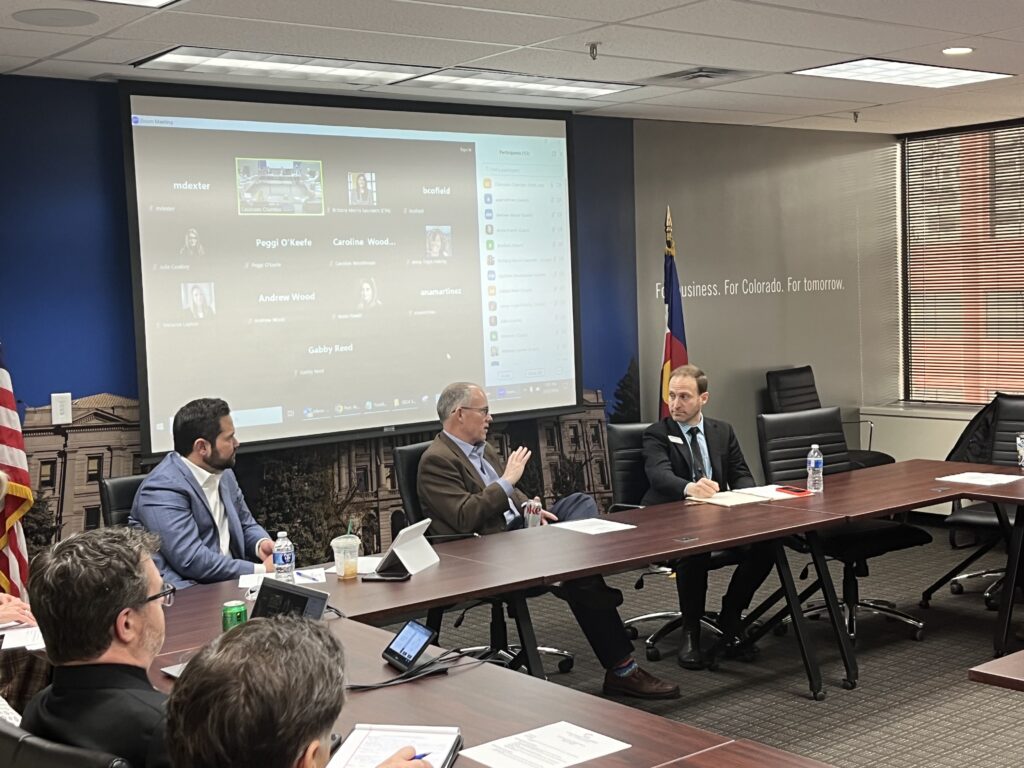The Colorado Chamber’s policy councils and alliances have been busy this week with new positions on eight bills from the 2024 legislative session. The Energy & Environment Council, Legal Reform Alliance and Technology Alliance discussed major legislation impacting the business community and heard from key leaders on future proposals.
Dominque Gomez, Deputy Director of the Colorado Energy Office, and Chris Piper, Director of Legislative Affairs for the Colorado Energy Office, joined the group to discuss their legislative agenda. They spoke with the group about three priority pieces of legislation they are working on and answered questions about the Greenhouse Gas Road Map 2.0.
The Technology Alliance was joined by David Edinger, Chief Information Officer and Executive Director, and Michael McReynolds, Senior Manager Government Affairs, with the Office of Information Technology. They discussed some of the key areas outlined in their strategic plan and their expectations for the 2024 Legislative Session.
The Colorado Chamber took positions on the following bills:
Energy & Environment:
SB 159: Oppose
The bill would cease the issuing of new oil and gas permits after January 1, 2030. The bill would also apply to permits needed to modify old wells to increase production. The Council opposed this legislation due to the detrimental effect it would have on the oil and gas industry in Colorado, which could result in the loss of hundreds of thousands of jobs across the state. SB 159 has also been dubbed a “job killer” by the Colorado Chamber.
Legal Reform Alliance:
SB 130: Support
The bill incrementally increases the noneconomic damages limitation in medical malpractice from $300,000 to $500,000 over the course of five years beginning January 1, 2025.
HB 1083: Position Changed From Oppose to Monitor
The bill requires the Division of Insurance to conduct a study of construction liability insurance for construction professionals in Colorado. It also requires sellers of residential properties to provide buyers with information regarding the insurance coverage for the property subject to the sale. The Alliance moved their position from “opposed” to “monitor” after amendments were filed in the House Business Affairs & Labor Committee.
HB 1220: Amend
Current law limits the amount of money that a claimant for workers’ compensation benefits may receive dependent on the claimant’s impairment rating. The bill removes these limitations and replaces them with one limit of $300,000, adjusted annually by the director of the division of workers’ compensation. The Chamber has been working on amendments to the bill with the sponsors regarding the cap limit and the claimant’s impairment rating.
Technology Alliance:
HB 1121: Amend
The bill expands the current statute regarding right to repair to include digital electronic equipment. The bill includes some exemptions; however, the Alliance would like to see more exemptions included, which is why the Chamber took an amend position.
HB 1129: Oppose
The bill requires delivery network companies to develop deactivation policies and make various disclosers to drivers and customers. The Chamber is opposed to the bill due to its overreaching nature, possible impact on delivery times and increase of costs for businesses.
SB 158: Amend
The bill requires a social media company to post published policies for each of its social media platforms. The bill also includes various requirements including age verification, parental tools and safeguards for children. The Chamber took an amend position to the bill due to some issues surrounding the language and exemptions within the bill.
HB 1325: Support
The bill creates two tax incentives to support the development of the quantum technology ecosystem in the state. These incentives aim to foster greater access to capital for quantum businesses and establish a shared research facility for industry and higher education.

